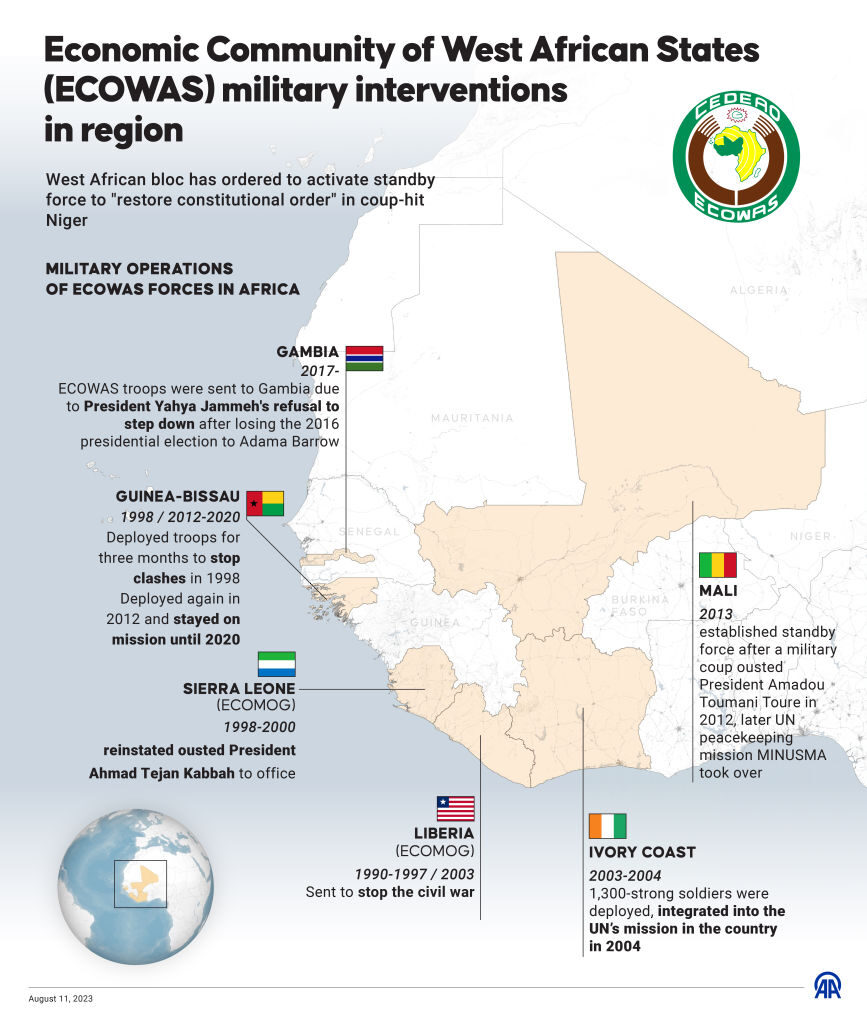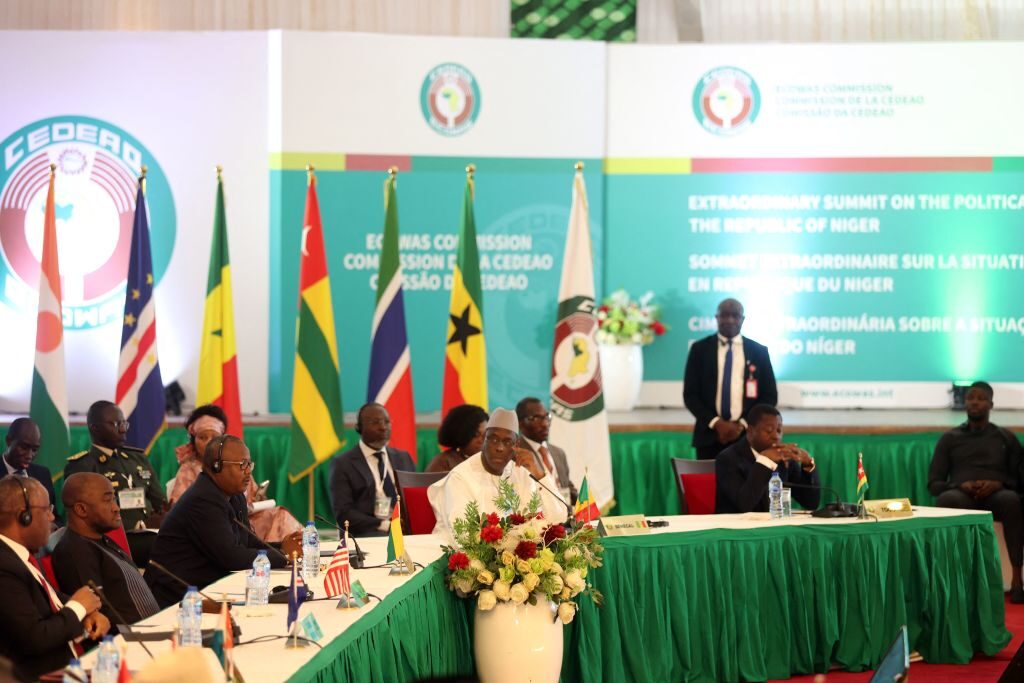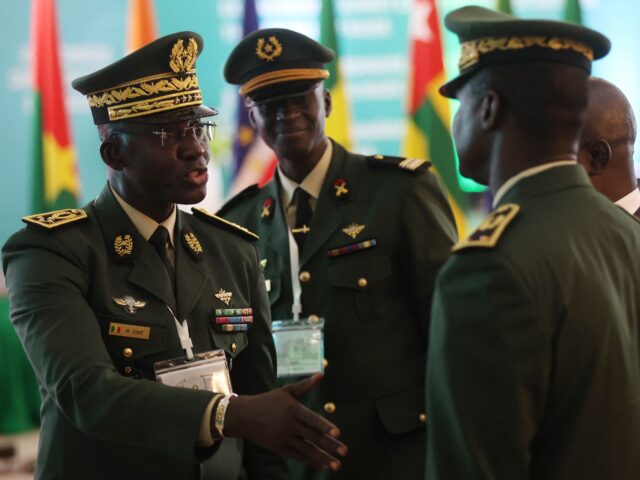The Economic Community of West African States (ECOWAS), a coalition led by Nigeria, agreed during an emergency meeting on Thursday to order its military leaders to “activate” its armed forces “immediately” to prepare for an invasion of Niger.
Niger succumbed to a coup d’etat on July 26 against democratically elected President Mohamed Bazoum, orchestrated by a group calling itself the “National Council for the Safeguard of the Homeland.” Led by the head of Bazoum’s presidential guard, General Abdourahamane Tchiani, the coup plotters claimed their intervention was necessary because Bazoum had not adequately addressed a variety of radical jihadist terrorist groups causing violence and threatening to destabilize the country. Tchiani declared himself the president of the country but has received no official recognition from most of Niger’s allies.
The Niger coup is the latest in a string of similar actions and the third attempt to oust Bazoum since he became president in 2021. Bazoum is believed to be in his presidential residence; he described himself as a “hostage” in a Washington Post op-ed that the coup plotters allowed him to publish and reports indicate he no longer has access to electricity or fresh food. Elsewhere in the region, Guinea, Burkina Faso, and Mali have all fallen to military coups in the past two years, turning their governments hostile towards former colonial ruler France and against America.
ECOWAS, a trade and security block that Niger formally belongs to, issued a forceful declaration shortly after the Tchiani coup announced that the “National Council” had until August 6 to restore Bazoum’s rule or the group would “take all measures necessary,” including “the use of force,” to undo the coup. In response to the threat, the military juntas in Burkina Faso and Mali issued a joint statement that they would interpret any attack against Niger as a “declaration of war” against them, as well, and fight on Tchiani’s behalf.

An infographic titled “Economic Community of West African States (ECOWAS) military interventions in region” on August 11, 2023. West African bloc has ordered to activate standby force to ‘restore constitutional order’ in coup-hit Niger. (Yasin Demirci/Anadolu Agency via Getty Images)
The deadline passed on Sunday with no action by ECOWAS, though senior ECOWAS official Abdel-Fatau Musah claimed, “All the elements that will go into any eventual intervention have been worked out here, including the resources needed, the how and when we are going to deploy the force.”
Nigerian President Bola Tinubu organized a second emergency ECOWAS meeting on Thursday in which the group, through a formal joint statement, announced that it would prepare for an immediate military operation in Niger. Among the list of actions ECOWAS agreed to in its resolution following the meeting was an order to “direct the Committee of the chief of defense staff to activate the ECOWAS standby force with all its elements immediately.”
“Order the deployment of the ECOWAS standby force to restore constitutional order in the Republic of Niger. Underscore its continued commitment for the restoration of constitutional order through peaceful means,” the commands continued.
The resolution justified the preparation for the use of force on the grounds that “all diplomatic efforts made by ECOWAS, in resolving the crisis have been defiantly repelled by the military leadership of the Republic of Niger.” ECOWAS initially sent a group of diplomats to Niamey, the capital of Niger, following the coup, but the group did not manage to reach any agreements with the “National Council for the Safeguard of the Homeland.”
A second attempt this week to send diplomats failed after the military chiefs refused to allow the ECOWAS envoys to land, citing “the current context of people’s anger and revolt following sanctions imposed by ECOWAS does not allow us to welcome the so-called delegation with the required serenity and safety.” That group of diplomats also included representatives from the African Union and United Nations.
ECOWAS had initially voted to impose multiple sanctions on Niger, including closing all mutual borders, ceasing trade, and freezing Nigerien assets in their banks. Its resolution on Thursday reiterated its will to “enforce all measures in particular border closures and strict travel bans and assets freeze on all persons or groups of individuals whose actions hinder all peaceful efforts aimed at ensuring the smooth and complete restoration of constitutional order.

The plenary of the Economic Community of West African States (ECOWAS) Head of States and Government extraordinary session in Abuja, on August 10, 2023. West African leaders joined for an emergency summit on the coup in Niger, whose new military rulers have defied an ultimatum — backed by the threat of force — to restore the elected president and pressed ahead with appointing a new government. ( KOLA SULAIMON/AFP via Getty)
In addition to Tinubu, the ECOWAS meeting counted on the attendance of the presidents of Benin, Ghana, Cote d’Ivoire, Senegal, Sierra Leone, Togo, Guinea Bissau, Gambia, Liberia, and Cabo Verde. Special representatives for the African Union and United Nations also participated.
Despite the resolution approving military action, Tinubu claimed in remarks following the meeting that, for ECOWAS, “it is crucial that we prioritize diplomatic negotiations and dialogue.” He insisted, however, that “no option is taken off the table, including the use of force as a last resort.”
In contrast, Cote d’Ivoire’s President Alassane Ouattara claimed ECOWAS was looking to start a military operation to oust the coup “as soon as possible,” according to the Agence France-Presse (AFP).
“The Chiefs of Staff will have other conferences to finalize things but they have the agreement of the Conference of Heads of State for the operation to start as soon as possible,” Ouattara claimed. “We are determined to restore president Bazoum to his functions.”
Ouattara noted it would not be ECOWAS’s first military operation – the group had previously intervened, most notoriously in Liberia – and that the bloc could simply “not accept” another coup.
Tchiani’s coup group has yet to act in response to the ECOWAS resolution at press time. It has instead focused on firing and replacing senior officials within Niger’s various federal ministries, cementing its control of bureaucratic functions. Tchiani ordered the closure of Nigerien airspace following the initial passage of the August 6 deadline in an attempt to prevent ECOWAS or its allies from flying fighter aircraft over the country.
In addition to ECOWAS, Tchiani is facing a separate threat to his seizure of power: former Tuareg rebel leader Rhissa Ag Boula announcing on Wednesday that he had gathered an army to restore Bazoum to power.
“Niger is the victim of a tragedy orchestrated by people charged with protecting it,” Ag Boula declared, vowing to use “any means necessary” to oust Tchiani. His group has yet to make any significant moves, according to reports at press time.
Bazoum is closely allied to the administration of leftist American President Joe Biden, which maintains a robust presence of over 1,000 soldiers in Niger, as per the Pentagon this week. Secretary of State Antony Blinken issued an approving statement following the ECOWAS meeting on Thursday but did not mention the threat of use of force or any suggestions that American troops would aid such an operation.
“The United States joins the Economic Community of West African States (ECOWAS) in calling for the restoration of constitutional order in Niger. The United States appreciates the determination of ECOWAS to explore all options for the peaceful resolution of the crisis,” Blinken said. “Like ECOWAS, the United States will hold the Council for the Safeguard of the Homeland (CNSP) accountable for the safety and security of President Bazoum, his family, and detained members of the government.”
Follow Frances Martel on Facebook and Twitter.

COMMENTS
Please let us know if you're having issues with commenting.